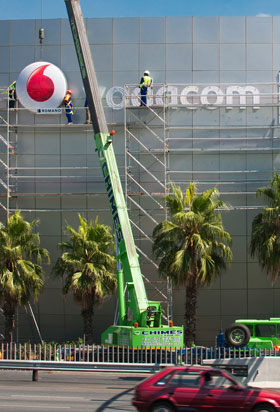 Vodacom’s long-running legal dispute with a fixer who recently won a case against it in a Democratic Republic of Congo court is still simmering. And accusations are being made of improper influence over the Congo’s judiciary.
Vodacom’s long-running legal dispute with a fixer who recently won a case against it in a Democratic Republic of Congo court is still simmering. And accusations are being made of improper influence over the Congo’s judiciary.
The Kinshasa Commercial Court ruled in January that Vodacom had to pay Moto Mabanga, the SA-based fixer, US$21m. This week, Mabanga said that a senior Vodacom executive, Nkateko “Snakes” Nyoka, went to the Congo to petition the acting judge president of the supreme court, Pungwe Massua, to prevent the auctioning of Vodacom’s shares in its business there.
Nyoka is the head of legal and regulatory affairs at Vodacom.
The company confirmed that Nyoka flew to the DRC on 1 June to brief its legal counsel.
The latter had petitioned Massua to stop the auction, which was set for 3 June. “Neither Nyoka nor anyone else from Vodacom met with Massua,” Vodacom said this week.
Nyoka was in the headlines recently when the key witness in the MTN licence scandal in Iran, former company executive Chris Kilowan, alleged that Nyoka had been involved.
Nyoka, a former MTN executive, is alleged to have signed a fax that was sent by former MTN commercial director Irene Charnley in November 2004 to the head of Sairan, an arms manufacturer owned by Iran’s ministry of defence. The fax is alleged to have detailed how Charnley was trying to set up a meeting between SA state-owned arms company Denel and an Iranian helicopter company.
Nyoka has denied any knowledge of it and MTN has denied any impropriety over its licence. Attempts to contact Charnley this week were unsuccessful.
Mabanga said this week that Massua had cancelled the auction of Vodacom’s shares and the police had locked the gate to the court so that it could not take place.
He said his lawyers had written a “strongly worded” letter to the supreme court in which they claimed that Massua had acted “illegally” and demanded an investigation.
Meanwhile, Mabanga has asked the commercial court to issue a second notice of payment, which he said Vodacom never responded to. He said a new auction date would be set soon.
Vodacom denied this and said the auction was postponed, not cancelled, and that it had not received another notice of payment from the court. “The last auction was postponed, not cancelled, by the first president of the supreme court, pending the outcome of two court proceedings before the commercial court of Kinshasa,” said Vodacom’s chief officer of corporate affairs, Maya Makanjee. “The postponement of the auction was obtained through legal counsel in accordance with accepted legal practice in the DRC. Vodacom supported this intervention in the interest of due process and transparency.”
The first appeal is against the auction and the second against the haste in setting the auction date.
The Mail & Guardian reported on the dispute between Mabanga’s company, Namemco Energy, and Vodacom in August 2010. At the time, Mabanga was suing the cellphone conglomerate for R396m in the high court in Johannesburg. The amount was allegedly for work done between 6 May 6 and 31 July 2007 and between 12 September 2007 and 31 August 2008.
According to the consultancy agreements between Vodacom and Namemco Energy, Mabanga was supposed to advise Vodacom on economic, sociopolitical and security conditions in the Congo, provide advice and assistance on “government relations issues” in the country, advise on and assist with the relationship between Vodacom and its Congolese partner, Congolese Wireless Network, ensure that Vodacom’s DRC staff were safe and not harassed or obstructed from doing their jobs, identify parties interested in buying Congolese Wireless Network’s 49% shareholding in Vodacom Congo and securing visas for Vodacom staff to enter the country.
Mabanga said he switched his legal challenge from SA to the DRC after he heard that Vodacom wanted to sell its business interests there. “If it had sold its 51% in Vodacom DRC, it would have been difficult for me to recoup the money I was owed. So we went to court in the DRC to attach the 5% of its shareholding in Vodacom DRC.” — (c) 2012 Mail & Guardian
- Visit the Mail & Guardian Online, the smart news source




